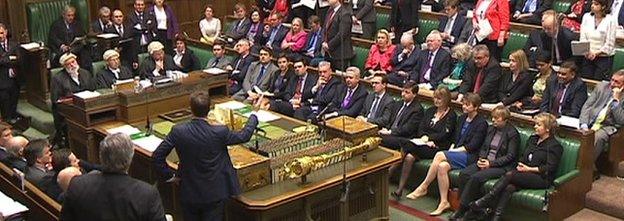Nick Clegg: Tory MPs moving goalposts on EU referendum
- Published

Nick Clegg stood in for David Cameron at Prime Minister's Questions
Deputy Prime Minister Nick Clegg has accused Eurosceptic Tory MPs of "moving the goalposts" on an EU referendum ahead of a Commons vote on the issue.
Mr Clegg, standing in for David Cameron at prime minister's questions, said the coalition government had already passed legislation guaranteeing an EU referendum if the rules change.
The Tory MPs want an EU referendum even if there is no rule change.
Labour accused the prime minister of "caving in" to his backbenchers.
Up to 100 Tory MPs are expected to vote for an amendment after 1900 BST expressing "regret" at the lack of a bill promising an "in-out" referendum on the EU in the Queen's Speech while some Conservative ministers will abstain.
Shortly before the vote, Foreign Secretary William Hague urged backbenchers to take the fight to Labour, at a meeting of the influential 1922 Conservative committee.
The BBC's political editor Nick Robinson said Mr Cameron was trying to put on a "brave face" about recent arguments in his party over Europe but his frustration over the situation was evident.
At Prime Minister's Questions, deputy Labour leader Harriet Harman said it was extraordinary that Mr Clegg would not say whether the PM would have voted "for the government, against the government or showing real leadership by abstaining" in a vote on an amendment to the Queen's Speech later.
A series of Tory MPs also asked the deputy PM why he was not backing the idea of an in-out referendum.
Edward Leigh waves an old Liberal Democrat leaflet features Nick Clegg saying it was time for a "real referendum on Europe"
Mr Clegg told them: "We did actually spend 100 days in this House in the early part of this parliament passing legislation... which for the first time ever gives a guarantee in law about when a referendum on Europe will take place - when the rules change, when new things are asked of the United Kingdom within the European Union.
"You and your colleagues in the Conservative Party are perfectly free to change the goalposts but we have this legislation, the people of Britain have a guarantee when a referendum will take place and that is what I suggest we should all go out and promote."
Mr Clegg added that as changes were expected to the EU he thought it was a "matter of when, not if" this "referendum lock" would be triggered.
Speaking later in the Commons, Chancellor George Osborne said fundamental changes were needed in Europe but he was "absolutely confident" the prime minister could negotiate a new settlement for the UK.
Many Conservative backbenchers are angry that Mr Cameron's promise of an in-out vote by 2017 was not mentioned in the Queen's Speech, which sets out the government's plans for the year ahead.
In an unusual move, they will seek to amend their own government's motion welcoming the speech.
'Uncertainty'
This is set to go ahead despite the Conservative leadership on Tuesday making a concession by publishing a draft bill on holding a referendum, in an effort to calm tensions.
Labour leader Ed Miliband told the BBC that Mr Cameron had "completely lost control" of his party and the Tories were "arguing amongst themselves about Europe and not sorting out problems of the country".
But Mr Cameron has countered Labour's criticism by arguing that he is the only major party leader to be promising a referendum, in the event of winning a parliamentary majority at the next general election, in 2015.
Asked about his own plans, Mr Miliband replied: "The Labour Party's position is we don't think it is right now to commit to an in-out referendum in four years time. We think it would cause uncertainty for the country at a time when we are trying to sort out the problems of the economy.
"Let's focus on sorting out jobs and living standards and problems the economy faces. By contrast you see a Conservative Party that is... just banging on about Europe and not sorting out the problems the economy faces."
Arguments over Europe have been building within the Conservative Party over several months, with many MPs worried about the rise in popularity of the anti-EU membership UK Independence Party.
Draft bill
Backbenchers have been urging the leadership to enshrine its promise of a referendum - which would follow a renegotiation of the UK's relationship with the EU - into legislation.
But the Liberal Democrats oppose such a move and no plans were mentioned in the Queen's Speech. This prompted the amendment, which has been signed by 92 MPs, external.
Conservative MP John Baron, who tabled the amendment, said that unless the EU could be "re-engineered" to focus on trade rather than political integration, then the UK should withdraw.
The Conservative leadership, by publishing its separate draft bill on a referendum on Tuesday, will hope to cut the number of votes in favour of the amendment.
The party hopes that the draft bill can be carried forward by a Tory MP as a private member's bill, as, without Lib Dem backing, it cannot be a government bill.
Given the Conservatives do not have a Commons majority, and the limited parliamentary time available for private members' bills, it would be highly unlikely to enter law but would act as a signal to backbenchers of the prime minister's intent. The ballot to choose who can bring forward private member's bills will be held on Thursday.
Two cabinet ministers - Defence Secretary Philip Hammond and Education Secretary Michael Gove - have said they would vote to leave the EU if relations with Brussels remain as they currently are,
UK Independence Party leader Nigel Farage - who campaigns for a UK exit - described the proposed draft bill as "nothing more than gesture politics".
- Published13 May 2013
- Published12 May 2013
- Published16 May 2013